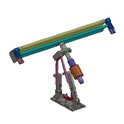As a supplier of the ResoLab - 1000 Lab Grade Ultrasonicator, I am frequently asked about its various features, and one question that comes up quite often is whether it has a temperature alarm function. In this blog post, I'll delve into this topic in detail, exploring the importance of temperature control in ultrasonication, the capabilities of the ResoLab - 1000, and how it compares to other models in our product line.
The Significance of Temperature Control in Ultrasonication
Ultrasonication is a powerful technique used in a wide range of laboratory applications, including cell disruption, sample preparation, and nanomaterial synthesis. During the ultrasonication process, high - frequency sound waves are generated, which create cavitation bubbles in the liquid medium. When these bubbles collapse, they release a large amount of energy, leading to mechanical and chemical effects. However, this energy release also generates heat, which can have a significant impact on the sample being processed.
For many biological samples, such as proteins and enzymes, high temperatures can cause denaturation, leading to a loss of activity. In chemical reactions, temperature can affect reaction rates and product yields. Therefore, maintaining a stable temperature during ultrasonication is crucial to ensure the integrity and quality of the sample. This is where a temperature alarm function becomes invaluable. A temperature alarm can alert the user when the temperature exceeds a pre - set limit, allowing them to take corrective actions, such as adjusting the power output or cooling the sample.
Does the ResoLab - 1000 Lab Grade Ultrasonicator Have a Temperature Alarm Function?
The ResoLab - 1000 Lab Grade Ultrasonicator is indeed equipped with a temperature alarm function. This feature is designed to provide an extra layer of protection for your valuable samples. The ultrasonicator allows you to set a maximum temperature threshold according to your specific requirements. Once the temperature of the sample reaches this limit, the temperature alarm will be triggered, notifying you immediately.
The temperature sensor in the ResoLab - 1000 is highly accurate, ensuring that you receive reliable temperature readings. This accuracy is essential for precise control of the ultrasonication process. Additionally, the alarm can be set to different modes, such as audible, visual, or both, depending on your preference and the laboratory environment.
How the Temperature Alarm Function Works
The temperature alarm function in the ResoLab - 1000 operates in a straightforward manner. First, you need to set the desired temperature limit using the intuitive control panel. The control panel is user - friendly, with clear instructions and easy - to - use buttons. Once the limit is set, the temperature sensor continuously monitors the temperature of the sample.
If the temperature exceeds the pre - set limit, the alarm will be activated. In the audible mode, a loud beep will sound, which can be heard even in a noisy laboratory environment. In the visual mode, a warning light on the control panel will flash, providing a clear visual indication of the temperature issue. You can then take appropriate measures, such as reducing the power output of the ultrasonicator or adding a cooling device to the sample.
Comparing the ResoLab - 1000 with Other Models
In our product line, we also offer the ResoLab - 500 Lab Grade Ultrasonicator and the ResoLab - 2000 Lab Grade Ultrasonicator. While all three models are high - quality ultrasonicators, they have some differences in terms of their temperature alarm capabilities.
The ResoLab - 500 is a more compact and entry - level model. It also has a temperature alarm function, but its temperature range and accuracy are slightly more limited compared to the ResoLab - 1000. This makes the ResoLab - 500 suitable for less demanding applications where precise temperature control is not as critical.
On the other hand, the ResoLab - 2000 Lab Grade Ultrasonicator is a more powerful and advanced model. It offers a wider temperature range and even higher accuracy in temperature sensing. The ResoLab - 2000 is ideal for large - scale and high - precision applications, where strict temperature control is essential.
Benefits of the Temperature Alarm Function in the ResoLab - 1000
The temperature alarm function in the ResoLab - 1000 offers several significant benefits. Firstly, it helps to protect your samples from damage caused by overheating. This is especially important for expensive or hard - to - obtain samples, as even a small amount of temperature - induced damage can have a significant impact on the results of your experiments.
Secondly, the temperature alarm function improves the reproducibility of your experiments. By maintaining a stable temperature, you can ensure that the ultrasonication process is consistent from one experiment to another. This is crucial for accurate data analysis and reliable research results.


Finally, the temperature alarm function enhances the safety of your laboratory operations. By alerting you to potential temperature issues, it allows you to take preventive measures, reducing the risk of accidents and equipment damage.
Conclusion
In conclusion, the ResoLab - 1000 Lab Grade Ultrasonicator does have a temperature alarm function, which is a valuable feature for any laboratory that uses ultrasonication. This function provides accurate temperature monitoring and reliable alarm notifications, ensuring the safety and integrity of your samples.
If you are in the market for a high - quality ultrasonicator with advanced temperature control capabilities, the ResoLab - 1000 is an excellent choice. To learn more about the ResoLab - 1000 Lab Grade Ultrasonicator and our other products, please feel free to contact us. We are always ready to assist you with your procurement needs and answer any questions you may have.
References
- Ultrasonication in Analytical Chemistry: Principles and Applications. John Wiley & Sons.
- Handbook of Laboratory Ultrasonics. CRC Press.






